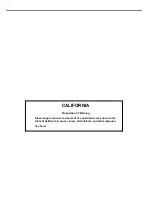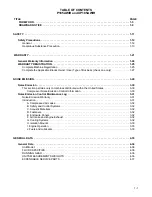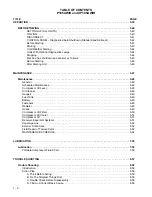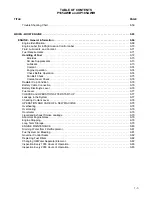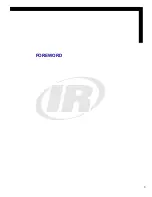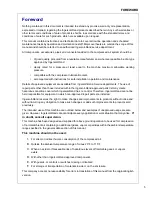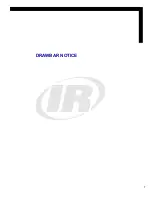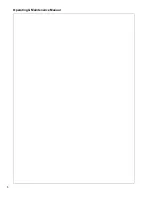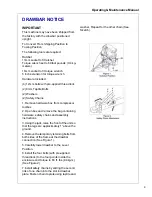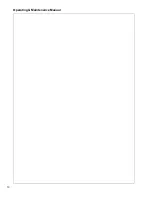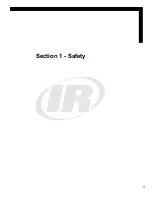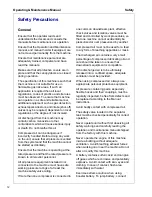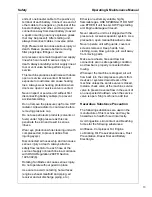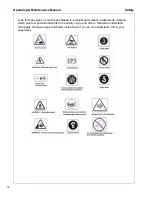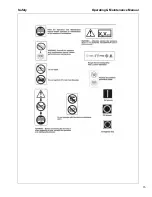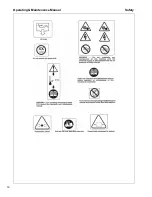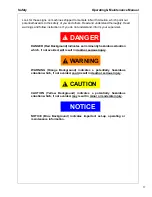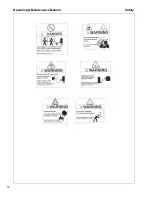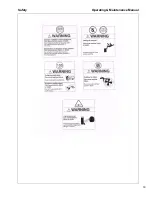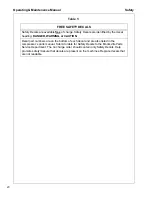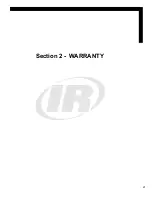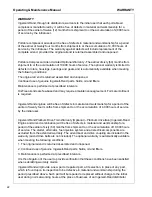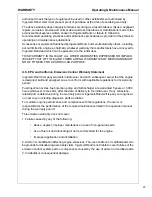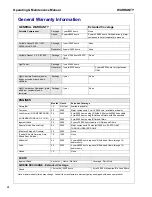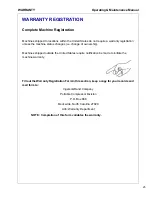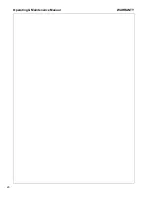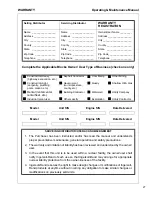
Operating & Maintenance Manual
Safety
12
Safety Precautions
General
Ensure that the operator reads and
understands the decals and consults the
manuals before maintenance or operation.
Ensure that the Operation and Maintenance
manual, and manual holder if equipped, are
not removed permanently from the machine.
Ensure that maintenance personnel are
adequately trained, competent and have
read the manuals.
Make sure that all protective covers are in
place and that the canopy/doors are closed
during operation.
The specification of this machine is such that
the machine is not suitable for use in
flammable gas risk areas. If such an
application is required then all local
regulations, codes of practice and site rules
must be observed. To ensure that machine
can operate in a safe and reliable manner,
additional equipment such as gas detection,
exhaust spark arrestors, and intake (shut-off)
valves may be required, dependent on local
regulations or the degree of risk involved.
Air discharged from this machine may
contain carbon monoxide or other
contaminants which will cause serious injury
or death. Do not breathe this air.
Compressed air can be dangerous if
incorrectly handled. Before doing any work
on the unit, ensure that all pressure is vented
from the system and that the machine cannot
be started accidentally.
Ensure that the machine is operating at the
rated pressure and that the rated pressure is
known to all relevant personnel.
All air pressure equipment installed in or
connected to the machine must have safe
working pressure ratings of at least the
machine safety valve rating.
If more than one compressor is connected to
one common downstream plant, effective
check valves and isolation valves must be
fitted and controlled by work procedures, so
that one machine cannot accidentally be
pressurized or over pressurized by another.
Compressed air must not be used for a feed
to any form of breathing apparatus or mask.
The discharged air contains a very small
percentage of compressor lubricating oil and
care should be taken to ensure that
downstream equipment is compatible.
If the discharged air is to be ultimately
released into a confined space, adequate
ventilation must be provided.
When using compressed air, always use
appropriate personal protective equipment.
All pressure containing parts, especially
flexible hoses and their couplings, must be
regularly inspected, be free from defects and
be replaced according to the Manual
instructions.
Avoid bodily contact with compressed air.
The safety valve located in the separator
tank must be checked periodically for correct
operation.
Never operate unit without first observing all
safety warnings and carefully reading the
operation and maintenance manual shipped
from the factory with this machine.
Never operate the engine of this machine
inside a building without adequate
ventilation. Avoid breathing exhaust fumes
when working on or near the machine. Do not
alter or modify this machine.
A battery contains sulfuric acid and can give
off gases which are corrosive and potentially
explosive. Avoid contact with skin, eyes and
clothing. In case of contact, flush area
immediately with water.
Exercise extreme caution when using
booster battery. To jump battery, connect
Summary of Contents for P185AWIR
Page 6: ...1 4...
Page 7: ...3 FOREWORD...
Page 8: ...4...
Page 10: ...6...
Page 11: ...7 DRAWBAR NOTICE...
Page 12: ...Operating Maintenance Manual 8...
Page 14: ...Operating Maintenance Manual 10...
Page 15: ...11 Section 1 Safety...
Page 19: ...Safety Operating Maintenance Manual 15...
Page 20: ...Operating Maintenance Manual Safety 16...
Page 22: ...Operating Maintenance Manual Safety 18...
Page 23: ...Safety Operating Maintenance Manual 19...
Page 25: ...21 Section 2 WARRANTY...
Page 30: ...Operating Maintenance Manual WARRANTY 26...
Page 32: ...Operating Maintenance Manual WARRANTY 28...
Page 33: ...29 Section 3 NOISE EMISSION...
Page 39: ...35 Section 4 GENERAL DATA...
Page 42: ...Operating Maintenance Manual GENERAL DATA 38...
Page 43: ...39 SECTION 5 OPERATION...
Page 51: ...47 Section 6 MAINTENANCE...
Page 59: ...55 Section 7 LUBRICATION...
Page 61: ...57 Section 8 Trouble Shooting...

